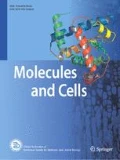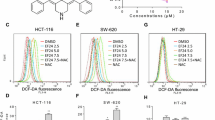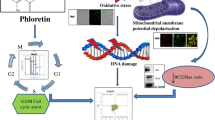Abstract
Curcumin (diferuloylmethane), the yellow pigment of turmeric, is one of the most commonly used and extensively studied phytochemicals due to its pleiotropic effects in several human cancers. In the current study, the therapeutic efficacy of curcumin was investigated in human colorectal carcinoma HCT-15 cells. Curcumin inhibited HCT-15 cells proliferation and induced apoptosis in a dose- and time-dependent manner. Hoechst 33342 and DCFHDA staining revealed morphological and biochemical features of apoptosis as well as ROS generation in HCT-15 cells treated with 30 and 50 μM curcumin. Over-expression of pre-mRNA processing factor 4B (Prp4B) and p53 mutations have been reported as hallmarks of cancer cells. Western blot analysis revealed that curcumin treatment activated caspase-3 and decreased expression of p53 and Prp4B in a time-dependent manner. Transfection of HCT-15 cells with Prp4B clone perturbed the growth inhibition induced by 30 μM curcumin. Fractionation of cells revealed increased accumulation of Prp4B in the nucleus, following its translocation from the cytoplasm. To further evaluate the underlying mechanism and survival effect of Prp4B, we generated siRNA-Prp4B HCT15 clones. Knockdown of Prp4B with siRNA diminished the protective effects of Prp4B against curcumin-induced apoptosis. These results suggest a possible underlying molecular mechanism in which Prp4B over-expression and activity are closely associated with the survival and regulation of apoptotic events in human colon cancer HCT-15 cells.
Similar content being viewed by others
References
Antosiewicz, J., Ziolkowski, W., Kar, S., Powolny, A.A., and Singh, S.V. (2008). Role of reactive oxygen intermediates in cellular responses to dietary cancer chemopreventive agents. Planta Med. 74, 1570–1579.
Bosher, J.M., and Labouesse, M. (2000). RNA interference: genetic wand and genetic watchdog. Nat. Cell Biol. 2, E31–36.
Choudhuria, T., Pala, S., Munna L., Dasa, T., and Saa, G. (2002). Curcumin induces apoptosis in human breast cancer cells through p53-dependent Bax induction. FEBS Lett. 512, 334–340.
Gross, T., Lützelberger, M., Weigmann, H., Klingenhoff, A., Shenoy, S., and Käufer, N.F. (1997). Functional analysis of the fission yeast Prp4 protein kinase involved in pre-mRNA splicing and isolation of a putative mammalian homologue. Nucleic Acids Res. 25, 1028–1035.
Han, S.S., Chung, S.T., Robertson, D.A., Ranjan, D., and Bondada, S. (1999). Curcumin causes the growth arrest and apoptosis of B cell lymphoma by downregulation of egr-1, c-myc, bcl-XL, NFkappa B, and p53. Clin. Immunol. 93, 152–161.
Hanif, R., Qiao, L., Shiff, S.J., and Rigas, B. (1997). Curcumin, a natural plant phenolic food additive, inhibits cell proliferation and induces cell cycle changes in colon adenocarcinoma cell lines by a prostaglandin-independent pathway. J. Lab. Clin. Med. 130, 576–584.
Hu, J., Xu, Y., Schappert, K., Harrington, T., Wang, A., Braga, R., Mogridge, J., and Friesen, J.D. (1994). Mutational analysis of the PRP4 protein of Saccharomyces cerevisiae suggests domain structure and snRNP interactions. Nucleic Acids Res. 22, 1724–1734.
Kojima, T., Zama, T., Wada, K., Onogi, H., and Hagiwara, M. (2001). Cloning of human PRP4 reveals interaction with Clk1. J. Biol. Chem. 276, 32247–32256.
Lee, S.K., Shehzad, A., Jung, J.C., Sonn, J.K., Lee, J.T., Park, J.W., and Lee, Y.S. (2012). Protein kinase C protects against mu α ltidrug resistance in human colon cancer cells. Mol. Cells 34, 61–69.
Letai, A.G. (2008). Diagnosing and exploiting cancer’s addiction to blocks in apoptosis. Nat. Rev. Cancer 8, 121–132.
Liu, Y., and Bodmer, W.F. (2006). Analysis of P53 mutations and their expression in 56 colorectal cancer cell lines. Proc. Natl. Acad. Sci. USA 103, 976–981.
Manikandan, R., Beulaja, M., Arulvasu, C., Sellamuthu, S., Dinesh, D., Prabhu, D., Babu, G., Vaseeharan, B., and Prabhu, N.M. (2012). Synergistic anticancer activity of curcumin and catechin: an in vitro study using human cancer cell lines. Microsc. Res. Tech. 75, 112–116.
Montembault, E., Dutertre, S., Prigent, C., and Giet, R. (2007). PRP4 is a spindle assembly checkpoint protein required for MPS1, MAD1, and MAD2 localization to the kinetochores. J. Cell Biol. 179, 601–609.
Moungjaroe, J., Nimmannit, U., Callery, P.S., Wang, L., Azad, N., Lipipun, V., Chanvorachote, P., and Rojanasakul, Y. (2006). Reactive oxygen species mediate caspase activation and apoptosis induced by lipoic acid in human lung epithelial cancer cells through Bcl-2 down-regulation. J. Pharmacol. Exp. Ther. 319, 1062–1069.
Mukhopadhyay, A., Banerjee, S., Stafford, L.J., Xia, C., Liu, M., and Aggarwal, B.B. (2002). Curcumin-induced suppression of cell proliferation correlates with down-regulation of cyclin D1 expression and CDK4-mediated retinoblastoma protein phosphorylation. Oncogene 21, 8852–8861.
Rosner, M., and Hengstschläger, M. (2008). Cytoplasmic and nuclear distribution of the protein complexes mTORC1 and mTORC2: rapamycin triggers dephosphorylation and delocalization of the mTORC2 components rictor and sin1. Hum. Mol. Genet. 17, 2934–2948.
Schwelnus, W., Richert, K., Opitz, F., Gross, T., Habara, Y., Tani, T., and Käufer, N.F. (2001). Fission yeast Prp4p kinase regulates pre-mRNA splicing by phosphorylating a non-SR-splicing factor. EMBO Rep. 2, 35–41.
Schwerk, C., and Schulze-Osthoff, K. (2005). Regulation of apoptosis by alternative pre-mRNA splicing. Mol. Cell 19, 1–13.
Shehzad, A., and Lee, Y.S. (2013). Molecular mechanisms of curcumin action: signal transduction. Biofactors 39, 27–36.
Shehzad, A., Lee, J., and Lee, Y.S. (2013). Curcumin in various cancers. Biofactors 39, 56–68.
Siegel, R., Naishadham, D., and Jemal, A. (2013). Cancer statistics, 2013. CA Cancer J. Clin. 63, 11–30.
Silvera, D., Formenti, S.C., and Schneider, R.J. (2010). Translational control in cancer. Nat. Rev. Cancer. 10, 254–266.
Su, C.C., Lin, J.G., Li, T.M., Chung, J.G., Yang, J.S., Ip, S.W., Lin, W.C., and Chen, G.W. (2006). Curcumin-induced apoptosis of human colon cancer colo 205 cells through the production of ROS, Ca2+ and the activation of caspase-3. Anticancer Res. 26, 4379–4389.
Thayyullathil, F., Chathoth, S., Hago, A., Patel, M., and Galadari, S. (2008). Rapid reactive oxygen species (ROS) generation induced by curcumin leads to caspase-dependent and -independent apoptosis in L929 cells. Free Radic. Biol. Med. 45, 1403–1412.
Author information
Authors and Affiliations
Corresponding author
About this article
Cite this article
Shehzad, A., Lee, J., Huh, TL. et al. Curcumin induces apoptosis in human colorectal carcinoma (HCT-15) cells by regulating expression of Prp4 and p53. Mol Cells 35, 526–532 (2013). https://doi.org/10.1007/s10059-013-0038-5
Received:
Revised:
Accepted:
Published:
Issue Date:
DOI: https://doi.org/10.1007/s10059-013-0038-5




